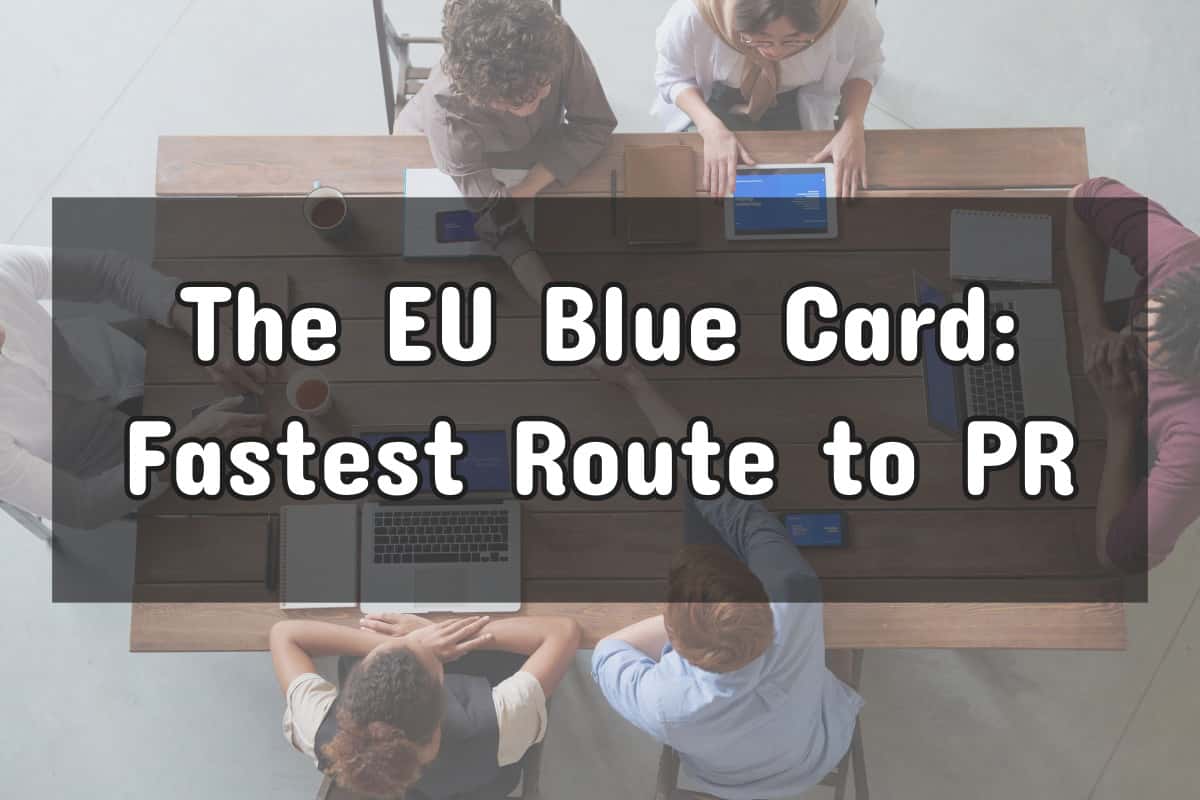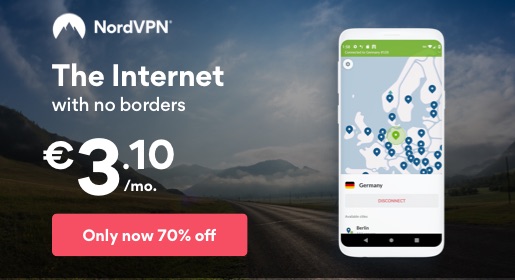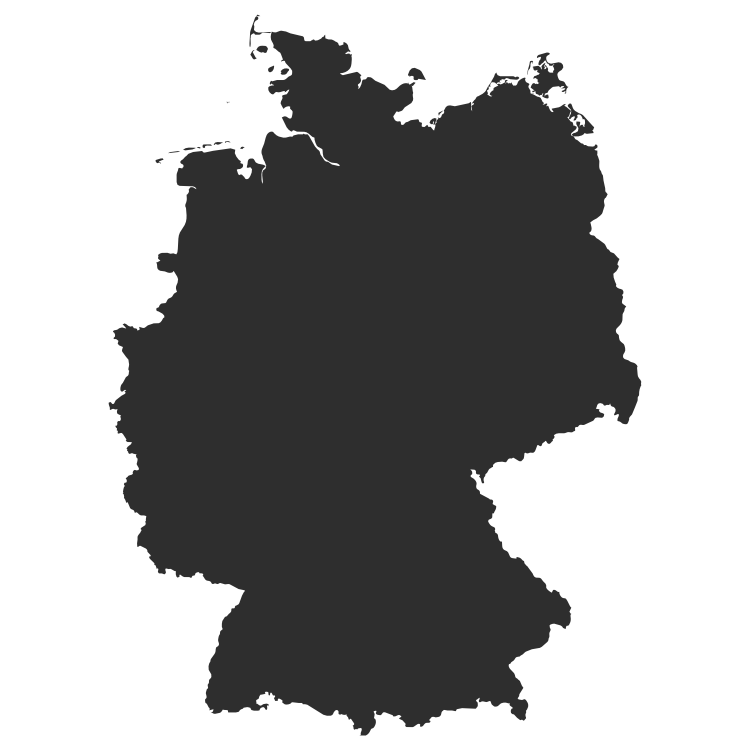If you’re an academically educated non-EU national and are looking to work in Germany, the EU Blue Card is likely the best option. It’s the easiest way to get a work permit, with the fewest administrative hurdles. It’s also the fastest route to achieve permanent residency, in as little as 21 months!
EU Blue Card Germany: An essential guide to the fastest route to PR
But what is it? And what are the requirements to apply?
We’ll look at all the important details, and discuss some pros and cons of obtaining the Blaue Karte in Germany.
What is it?
The Blue Card is an EU-wide standardised residence permit, available in all EU countries (except for Ireland and Denmark). Aimed at highly qualified individuals, the conditions in terms of salary and requirements nonetheless differ greatly between the different EU countries.
It’s also worth noting that economic powerhouse Germany accounted for 83% of the Blue Cards issued in 2018.
Requirements differ because European countries vary wildly in terms of cost of living, job prospects, and salary expectations.
So what are the specific requirements for getting one of these in Germany?
EU Blue Card Germany requirements
The basic requirements to qualify for the Blue Card (in Germany) are as follows:
- Minimum annual salary in 2020 of €55,200 (or €43,056 in some exceptional cases).
- Minimum academic qualification of a Bachelor’s degree, from a German higher
education institution or a foreign institution recognised as being equivalent. - An actual, written, confirmed job offer in Germany.
If you’re unsure about having your qualification recognised, check out our short guide to foreign qualification recognition.
However, there are numerous exceptions to these rules. If there’s one thing that Germany is well known for, it’s making simple things more complicated!
Exceptional cases
If you fall into any of the categories mentioned below, you may count as an exception.
However, such applications may need to be approved on a case-by-case basis by the Federal Agency for Employment.
This may lead to your application taking longer to process.
If you’re unsure about these exceptions, this great flowchart from apply.eu breaks things down really clearly.
So, what counts as an exception?
Exceptions based on work experience
Applicants with over five years of professional experience in their field may not need formal qualifications to apply for a Blue Card.
Ultimately, it’s up to the Federal Agency of Employment to sign off on this. But this could be a lifesaver for anyone with skills and experience which haven’t been formally recognised.
Exceptions for STEM fields
Workers qualified in STEM-related subjects (Science, Technology, Engineering or Mathematics) are always in high demand. This is great for your EU Blue Card Germany application.
If you have a bachelor’s degree or higher in a STEM-related subject, you’ll have to meet a lower minimum salary requirement to qualify for a Blue Card in Germany: €43,056, as opposed to €55,200.
Exceptions for shortage occupations
Some fields of employment are considered shortage occupations in Germany.
If you have a job offer in one of these in-demand areas, you’ll have to meet a lower minimum salary threshold to qualify for a Blue Card in Germany: €43,056, as opposed to €55,200.
Here are some examples of shortage occupations:
- IT consultants and analysts
- Software developers / programmers / architects
- Nurses
- Economists / business management experts
- Production assistants
- Sales representatives / analysts
- Architects
- Electrical engineers / fitters
- Sales / product managers
- Customer advisors / account managers
This is by no means an exhaustive list.
Do I need to speak German to qualify?
Technically, no, you don’t.
Your German skills aren’t assessed at any point during the application. And there is no formal requirement to have any level of German language competence.
HOWEVER, to be granted an EU Blue Card you do need a job offer.
And this will be much more difficult if you don’t speak German.
Less than 5% of jobs in Germany are advertised in English. German language skills are indispensable at the interview stage. And this is especially true if your job requires communication with German colleagues, clients, or customers.
That said, there are of course some fields where this might not be so important.
If you work in a STEM profession, or in a more “back end” position which doesn’t require much communication (eg. programming or software development), then not knowing German will be less of an issue for you.
Speaking German might also be less important if you’re aiming to work in a large, multinational company. Such companies tend to be more internationally focused, and as such you may find yourself with more English-speaking colleagues.
We’d still recommend that you learn at least some German. Even if it’s not required for your application, there are plenty of other reasons to learn the language.
You will also be able to obtain permanent residency faster, as we explain in the next section.
What are the advantages to the EU Blue Card?
Your fast track to permanent residency
Obtaining a Blue Card is the quickest way to secure permanent residency in Germany.
It takes only 33 months to be granted PR, compared to the five years it takes with a standard work permit.
And it gets better.
If you can achieve B1 level German and prove it with a recognised certificate, your wait for permanent residency will be reduced to just 21 months!
EU Blue Card Germany processing time
Blue Card applications also tend to get processed faster than general residence work permits.
Exact processing times will depend on the workload of your Ausländerbehörde (immigration office) at the time. But in the best cases, this can take as little as four weeks.
However, your application may take considerably longer if it has to be assessed by the Federal Agency for Employment. These are the minority of cases though when it comes to applications for the Blaue Karte.
This will only be the case if you’re applying under any kind of exceptional circumstances, as noted above (eg. substituting qualifications for work experience, or applying to work in a shortage occupation).
Maximum residency period
Blue Cards can be issued for a period of up to four years (although the minimum duration
is just 1 year).
In contrast, regular residence work permits are only issued for a maximum of 3 years.
However, if your job offer is not on a permanent employment contract, it will only be issued for the duration of the contract, plus three months.
The holder may also spend up to 12 months in total outside of Germany during the course of their Blue Card’s validity.
Benefits for spouses
The Blue Card is a great option if you have a spouse.
Spouses are not only granted residence along with the holder. They also have no obligation to fulfill any German language requirements and are allowed full access to the German labour market (They will still have to find a job though if they want to work!).
What are the disadvantages?
There are, however, a couple of minor downsides to the EU Blue Card in Germany.
Your Blue Card is tied to the original position that it was granted for. Therefore, during the first 2 years, you don’t have much flexibility when it comes to switching jobs.
Does that mean you can’t go out and find another job during your first 2 years?
No, but it does mean that you need to reapply at the Foreigners’ Office (Ausländerbehörde) for your Blue Card to be renewed.
In reality, this usually won’t be denied – as long as the salary and qualification requirements still line up with the original criteria to be granted a Blue Card.
However, you can’t always anticipate changes at work.
It’s not exactly unheard of to find that your job is very different to the position advertised. Or to have a toxic boss or workplace environment push you towards alternative employment.
So this inflexibility is definitely something to be aware of as a potential disadvantage of the Blue Card.
EU Blue Card Germany: Conclusion
The Blue Card is a great option for skilled individuals who want to live and work in Germany.
Its fast processing times, and effective fast-track to permanent residency make it an incredibly attractive prospect.
While it’s true that inflexibility can be an issue, after 2 years, this rule no longer applies.
Bear in mind that it gets you permanent residency after just 21 months if you learn German to B1 level, and then you’re completely protected in case you lose your job.
And even if you don’t achieve B1 level German, you still get permanent residency after 33 months.
Disclosure: Some of the links contained in this article are affiliate links, meaning we receive a small commission for any sales which result from these clicks. This does not in any way affect the price you pay for of any of the products or services. Thank you for supporting us - we appreciate it!










